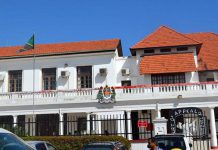AfricaPress-Tanzania: THE Court of Appeal has saved owners of Snow Crest and Wildlife Safaris Limited to be imprisoned as civil prisoners for allegedly failing to satisfy a court decree for the payment of $1.7m to the hotel’s presumed buyer.
The decree was issued by the High Court (Commercial Division) in favour of Grand Alliance Limited, the applicant, following a dispute involving the sale of shares of Snow Crest, which is Arusha-based five stars hotel.
Justices Batuel Mmilla, Rehema Mkuye and Barke Sahel ruled in favour of Wilfred Lucas Tarimo, Fredrick Wilfred Tarimo, Doreen Wilfred Tarimo and Irene Wilfred Tarimo, the respondents, after dismissing with costs an application for revision filed by the applicant.
“Going by the record, there is no evidence establishing bad faith for the respondents to warrant their arrest and detention as civil prisoners. We are of the considered view that the executing court properly released them. The application is without merit. It is dismissed with costs,” they said.
The applicant had moved the appellate court to revise the decision of the High Court, which declined his application for executing a decree by way of arrest and detention of the respondents as civil prisoners for allegedly acting in bad faith.
After noting that the respondents offered a decree in another case in which the consent decree was passed for a third party to satisfy the decree in the applicant’s case, the High Court ruled that the applicant was then at liberty to apply for attachment of such decree proposed for satisfying the decree in his case.
The applicant, therefore, stated in the application that it was improper for the executing court to decline to execute a decree which is yet to be satisfied and that it was incorrect, illegal and improper for the High Court to direct him to execute another decree in which he was not a party.
In their ruling, however, the justices of the appellate court agreed with the High Court that there was no act of bad faith committed by the respondents that would warrant for their detention and committal as civil prisoners.
“On our close reading of the applicant’s counter-affidavit, we find that the applicant miserably failed to establish that there was deliberate disposition of the properties by judgment debtors (respondents).”
The justices noted that the history of the subject matter of the suit was the sale of 5,000 shares of the hotel to the applicant which was declared null and void and the shares reverted back to the respondents.
According to them, having the shares reverted back to the respondents, they were free from any encumbrances as such their sale was not in contravention of the law, in particular, Order XXI Rule 39(2) of the Civil Procedure Code.
“In that regard, the subsequent sale of shares to the third party was not an act of bad faith or dishonest disowning of the obligation. We are satisfied that the default to pay was not due to refusal or neglect by the respondents to honour the obligation under the decree,” the justices said.
They found that the executing court properly declined to execute a decree by arrest and detention of the judgment debtors and there was nothing warranting for the Court to invoke its revisional powers.
The justices pointed out that the object of arrest and detention is to ensure the decree holder realises the money decreed in his favour and to protect honest judgment debtors, but the dishonest ones become liable to arrest and imprisonment.
The applicant and the respondents entered into a share acquisition agreement to purchase and acquired 5,000 shares in Snow Crest and Wildlife Safari Limited at $7,000,000.
It was a term of the agreement that the applicant paid $2,834,457.51 to the respondents and the remaining balance of $4,165,542.49 re-serviced a bank loan. The applicant paid $1,730,000 to the respondents and took over the management of the business of the hotel.
However, after some months, the respondents repossessed the management of the hotel for a reason that the applicant breached the agreement as he failed to pay the remaining balance. This prompted the applicant to sue the respondents. After the exchange of pleadings, the suit went to a full hearing.
At the end, the High Court rescinded the share acquisition agreement and ordered the respondents to refund the applicant $1,730,000 he paid for the acquisition of the shares. Aggrieved, the respondents appealed to the Court of Appeal, but their appeal was dismissed for lack of merit.
It was at that point in time when the applicant filed an application for execution of the decree by arrest and detention of the respondents as civil prisoners.







